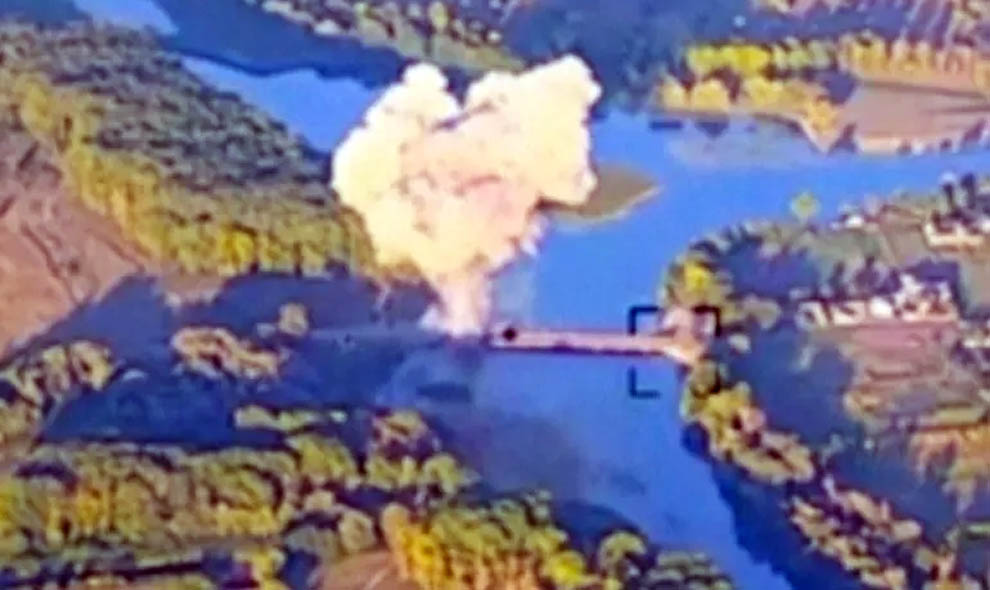International
Ukraine attacks second bridge in Russia’s Kursk, heads for buffer zone

Ukraine attacks second bridge in Russia’s Kursk, heads for buffer zone
Ukraine says it has destroyed a second bridge across the River Seym which winds through Russia’s Kursk region.
It is the second attack on a bridge in the region in a matter of days and comes as Ukraine presses a cross-border offensive that began on August 6.
On Friday, it said it had struck a bridge in the Russian town of Glushkovo.
“Minus one more bridge,” Ukrainian Air Force Commander Mykola Oleshchuk wrote on Telegram on Sunday, publishing an aerial video of a blast tearing through the bridge near the Russian town of Zvannoye.
He said the attacks were designed to disrupt Russian supply lines.
“The Air Force aviation continues to deprive the enemy of logistical capabilities with precision air strikes,” Oleshchuk said, without giving a date for the attack.
Hours after the attack, Ukrainian President Volodymyr Zelenskyy praised the military’s incursion and stated its aims for the first time.
“Our guys are doing a great job in all areas,” he said in his evening address on Sunday.
“It is now our primary task in defensive operations overall: to destroy as much Russian war potential as possible and conduct maximum counteroffensive actions. This includes creating a buffer zone on the aggressor’s territory -– our operation in the Kursk region.”
Pro-Kremlin military bloggers acknowledged the destruction of the first bridge near Glushkovo, which is about 12km (7.5 miles) north of the Ukrainian border, saying it would disrupt supply lines.
READ ALSO:
- FG moves against fake degrees, asks varsities to submit matriculation lists
- Six family members die after eating local delicacy in Kano
- Ganduje, Uzodinma 2027 joint-ticket campaign posters emerge on social media
Zvannoe is located a further 8km (5 miles) to the northwest.
According to Russia’s Mash news site, the attacks left only one bridge in the area intact, potentially complicating further Moscow’s attempts to replenish its forces and evacuate civilians.
Until now, Kyiv has said little about the goals of the surprise incursion, which began with tanks and other armoured vehicles, the largest attack on Russia since World War II.
Ukraine’s military chief, Oleksandr Syrskii, claimed last week that his forces had advanced across 1,000sq km (390sq miles) of Kursk, although it was not possible to independently verify the extent of its control.
The incursion has helped boost Ukrainian morale as Russia pushes forward in Ukraine’s eastern Donetsk region.
On Sunday, Moscow claimed to have taken the village of Svyrydonivka, about 15km (nine miles) from Pokrovsk, which is a key logistics hub for Ukrainian troops and towns across the eastern front.
Zelenskyy has urged Kyiv’s allies to lift the remaining restrictions on the use of Western weapons on targets deeper inside Russia, including in Kursk, saying his troops could deprive Moscow “of any ability to advance and cause destruction” if granted sufficient long-range capabilities.
Ukraine says bases inside Russia have been used to launch long-range attacks on Ukraine’s cities and energy infrastructure, causing significant damage and casualties.
On Sunday, Moscow targeted the capital Kyiv with ballistic missiles for a third time this month, according to the head of the municipal military administration, Serhiy Popko.
Zelenskyy said Russia had launched more than 40 missiles, 750 guided aerial bombs and 200 attack drones against Ukrainian villages and cities in the past week alone.
Ukraine attacks second bridge in Russia’s Kursk, heads for buffer zone
International
UK Court Hands Life Sentence to Nigerian Teen for Knife Attack Killing

UK Court Hands Life Sentence to Nigerian Teen for Knife Attack Killing
A Nigerian teenager residing in the UK, Jackson Uwagboe, has been sentenced to life imprisonment for the murder of 21-year-old Robert Robinson, following a brutal knife attack in Lewisham, London. The sentencing was delivered at the Old Bailey on Wednesday.
The Metropolitan Police confirmed that 19-year-old Uwagboe of Hamilton Street, Lewisham, was found guilty of murder on Tuesday, 10 February 2026, in a case stemming from a dispute over a stolen bicycle. The court ruled that Uwagboe must serve a minimum of 21 years before he can be considered for parole.
Uwagboe’s co-defendant, Eromosele Omoluogbe, 24, was earlier convicted of perverting the course of justice after assisting Uwagboe in attempting to flee to Nigeria via Heathrow Airport.
READ ALSO:
- Ogun Gov Rewards Nigeria’s Best Primary School Teacher with Car, Bungalow
- Police Bust Gang Armoury, Arrest Two Suspects in Delta
- Peter Obi Launches ‘Village Boys Movement’ to Rival Tinubu’s City Boys Ahead of 2027
Prior to this sentencing, two other men, Ryan Wedderburn, 18, and Kirk Harris, had already been convicted and handed life sentences in May 2025 for their roles in the same murder.
Detective Inspector Neil Tovey, who led the investigation, described the incident as a “brutal and sustained attack”. He said, “Robert was subjected to a brutal and sustained attack by a group of men armed with knives. He was unarmed, already wounded, and on the ground when Uwagboe attacked him. Today’s verdict brings justice for Robert Robinson and his family.”
The case has drawn attention to youth violence, knife crime, and gang-related activity in London, as well as the challenges faced by law enforcement in preventing violent disputes over seemingly minor disputes such as bicycle theft.
The sentencing underscores the UK judicial system’s approach to serious violent crimes, ensuring that perpetrators face long-term incarceration while providing a clear minimum term before parole consideration.
UK Court Hands Life Sentence to Nigerian Teen for Knife Attack Killing
International
UK-Based Nigerian Gets 13-Year Jail Term for Forcing Girlfriend to Abort Pregnancy

UK-Based Nigerian Gets 13-Year Jail Term for Forcing Girlfriend to Abort Pregnancy
A UK-based Nigerian man, Adeleke Adelani, has been sentenced to more than 13 years’ imprisonment for unlawfully aborting the pregnancy of his former partner after coercing her to take abortion medication on Valentine’s Day.
The offence occurred in 2020 when Adelani, then 28 years old, deceptively invited the woman — whose identity is legally protected — to his residence in Letterkenny under the guise of discussing the future of her pregnancy. Evidence before the court showed that the victim was nine weeks pregnant at the time of the incident.
Prosecutors told the court that upon her arrival, Adelani threatened the woman with violence and forced her to ingest five tablets of misoprostol, a drug used for medical abortions, thereby causing the unlawful termination of the pregnancy. The court heard that the defendant had researched the medication in advance and acted deliberately. The victim later contacted authorities, leading to Adelani’s arrest by Irish police.
READ ALSO:
- Lawmaker Jailed for Mocking President in Facebook Post
- Police to Arrest TikToker Mirabel After She Recants False Rape Claim
- Tinubu Reduces Reliance on U.S, Strengthens Defence Partnerships With Turkey, EU
At the time of the sentencing, Adelani was already serving a separate seven-year prison sentence for an unrelated offence. He had initially been due to stand trial last year but pleaded guilty before jury selection began, accepting responsibility for the charges brought against him.
During the sentencing hearing at the Letterkenny Circuit Court, the victim delivered a powerful impact statement, explaining that although she had chosen to forgive Adelani, the consequences of his actions would remain with her for life.
“I have forgiven the defendant,” she told the court. “That forgiveness does not mean what he did was acceptable. It means I refuse to let what he did continue to control my heart and my life. When he wrongfully imprisoned me and caused the termination of my nine-week pregnancy, he took far more than my freedom. He took my child. He took my sense of safety. He took a future that I had already begun to plan and love.”
In a letter read aloud in court, Adelani apologised to the victim, accepted full responsibility for his actions, and expressed remorse for the pain and trauma he caused.
Delivering judgment, John Aylmer described the crime as deliberate, premeditated, and deeply traumatic, stressing that it involved coercion, abuse, and a serious violation of trust. The judge sentenced Adelani to 11 years in prison, with the final two years suspended, for causing the unlawful termination of a pregnancy, and an additional five years, with the last 12 months suspended, for assault causing harm.
The sentences are to run concurrently, adding to Adelani’s existing term and resulting in an overall prison sentence exceeding 13 years. The case has reignited debate in Ireland and internationally about reproductive coercion, domestic abuse, and violence against women, with legal observers describing it as one of the most serious cases of its kind in recent years.
UK-Based Nigerian Gets 13-Year Jail Term for Forcing Girlfriend to Abort Pregnancy
International
Epstein, Ex-Israeli PM Named in Alleged Profiteering From Boko Haram Crisis

Epstein, Ex-Israeli PM Named in Alleged Profiteering From Boko Haram Crisis
A new investigative report by Drop Site News has alleged that the late American financier Jeffrey Epstein and former Israeli prime minister Ehud Barak leveraged Nigeria’s long-running Boko Haram insurgency to pursue commercial, security, and strategic interests in the country.
According to the investigation, emails released by the United States Department of Justice in 2018 show Epstein acting as a behind-the-scenes facilitator in discussions involving Jide Zeitlin, then chairman of Nigeria’s Sovereign Investment Authority, and Sultan Ahmed bin Sulayem, former chairman of DP World. The exchanges allegedly focused on attempts to secure control of key shipping terminals in Lagos and Badagry, following unsuccessful negotiations with successive Nigerian administrations dating back to 2005.
The report claims DP World was unwilling to invest in a proposed industrial zone in Nigeria without full or majority control of the adjoining port infrastructure, a demand that reportedly stalled the deal for years. Epstein, who died in a New York jail in 2019 while awaiting trial, is alleged to have helped revive talks by brokering introductions and strategic conversations.
READ ALSO:
- CBN Policies, Foreign Inflows Drive Naira to Two-Year Peak
- Edo Governor Okpebholo Names Mercy Johnson-Okojie Special Adviser
- Many Feared Dead as Suspected Lakurawa Militants Attack Kebbi Communities
Drop Site News further reported that bin Sulayem resigned on February 13 after renewed scrutiny of his past links to Epstein resurfaced publicly, intensifying attention on the historical port negotiations and the role of foreign intermediaries in Nigeria’s maritime sector.
Beyond logistics and port infrastructure, investigators highlighted what they described as near-daily correspondence between Epstein and Barak after the former Israeli leader left public office. Barak, who served as Israel’s defence minister until 2013, allegedly sought to deepen Israeli-Nigerian security cooperation, using Nigeria’s counter-insurgency battle as an entry point for Israeli-linked security, energy, and technology investments.
The report said Barak later relied on security networks in Nigeria to promote Israeli defence and surveillance firms. In 2015, Barak and a partner invested $15 million in FST Biometrics, founded by former Israeli intelligence chief Aharon Ze’evi Farkash. The firm’s Basel biometric system, originally deployed at Israel-Gaza crossings, was subsequently marketed in Nigeria as a counter-terrorism solution.
According to the investigation, the biometric technology was introduced at Babcock University as protection against Boko Haram threats, while also being pitched to African governments for broader identity management and population-control applications.
The report further cited a 2020 World Bank-supported initiative involving Israel’s National Cyber Directorate and Toka Group, a cyber-intelligence company co-founded by Barak. The partnership was presented as contributing to Nigeria’s national cybersecurity framework, but Drop Site News argued it also deepened Israeli corporate access to sensitive security architecture.
In its conclusion, the investigation alleged that a network of security interventions, port negotiations, and technology investments enabled Epstein and Barak to profit from instability associated with the Boko Haram conflict, while simultaneously advancing Israeli commercial and strategic interests in Nigeria. The outlet stressed that these claims are based on document reviews and correspondence, framing them as allegations rather than established legal findings.
Epstein, Ex-Israeli PM Named in Alleged Profiteering From Boko Haram Crisis
-

 News3 days ago
News3 days agoRamadan Begins in Nigeria as Sultan Confirms Crescent Sighting
-

 International1 day ago
International1 day agoCanada Opens New Express Entry Draw for Nigerian Workers, Others
-

 metro3 days ago
metro3 days agoSeven Killed in Horrific Crash at Ota Toll Gate
-

 News2 days ago
News2 days agoKorope Drivers Shut Down Lekki–Epe Expressway Over Lagos Ban (Video)
-

 Health2 days ago
Health2 days agoRamadan Health Tips: Six Ways to Stay Hydrated While Fasting
-

 News11 hours ago
News11 hours agoPolice to Arrest TikToker Mirabel After She Recants False Rape Claim
-

 metro1 day ago
metro1 day agoOsun Awards 55.6km Iwo–Osogbo–Ibadan Road Project to Three Contractors
-

 Entertainment2 days ago
Entertainment2 days agoActress Destiny Etiko Breaks Silence on Alleged Nollywood Betrayal















